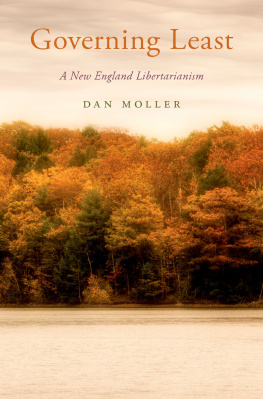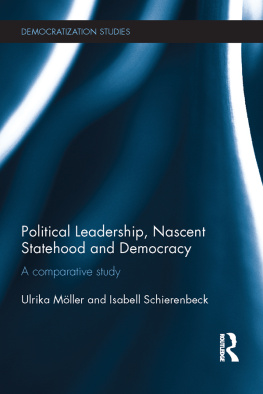Dan Moller - Governing Least
Here you can read online Dan Moller - Governing Least full text of the book (entire story) in english for free. Download pdf and epub, get meaning, cover and reviews about this ebook. year: 2018, publisher: Oxford University Press, genre: Politics. Description of the work, (preface) as well as reviews are available. Best literature library LitArk.com created for fans of good reading and offers a wide selection of genres:
Romance novel
Science fiction
Adventure
Detective
Science
History
Home and family
Prose
Art
Politics
Computer
Non-fiction
Religion
Business
Children
Humor
Choose a favorite category and find really read worthwhile books. Enjoy immersion in the world of imagination, feel the emotions of the characters or learn something new for yourself, make an fascinating discovery.
- Book:Governing Least
- Author:
- Publisher:Oxford University Press
- Genre:
- Year:2018
- Rating:5 / 5
- Favourites:Add to favourites
- Your mark:
- 100
- 1
- 2
- 3
- 4
- 5
Governing Least: summary, description and annotation
We offer to read an annotation, description, summary or preface (depends on what the author of the book "Governing Least" wrote himself). If you haven't found the necessary information about the book — write in the comments, we will try to find it.
Governing Least — read online for free the complete book (whole text) full work
Below is the text of the book, divided by pages. System saving the place of the last page read, allows you to conveniently read the book "Governing Least" online for free, without having to search again every time where you left off. Put a bookmark, and you can go to the page where you finished reading at any time.
Font size:
Interval:
Bookmark:

Oxford Political Philosophy
GENERAL EDITOR: SAMUEL FREEMAN, UNIVERSITY OF PENNSYLVANIA
Oxford Political Philosophy publishes books on theoretical and applied political philosophy within the Anglo-American tradition. The series welcomes submissions on social, political, and global justice, individual rights, democracy, liberalism, socialism, and constitutionalism.
N. Scott Arnold
Imposing Values: An Essay on Liberalism and Regulation
Peter de Marneffe
Liberalism and Prostitution
William J. Talbott
Human Rights and Human Well-being
Iris Marion Young
Responsibility for Justice
Paul Weithman
Why Political Liberalism? On John Rawlss Political Turn
Aaron James
Fairness in Practice: A Social Contract for a Global Economy
Margaret Moore
A Political Theory of Territory
Alan Thomas
Republic of Equals: Predistribution and Property-Owning Democracy
Dan Moller
Governing Least: A New England Libertarianism

Oxford University Press is a department of the University of Oxford. It furthers the Universitys objective of excellence in research, scholarship, and education by publishing worldwide. Oxford is a registered trade mark of Oxford University Press in the UK and certain other countries.
Published in the United States of America by Oxford University Press
198 Madison Avenue, New York, NY 10016, United States of America.
Oxford University Press 2019
All rights reserved. No part of this publication may be reproduced, stored in a retrieval system, or transmitted, in any form or by any means, without the prior permission in writing of Oxford University Press, or as expressly permitted by law, by license, or under terms agreed with the appropriate reproduction rights organization. Inquiries concerning reproduction outside the scope of the above should be sent to the Rights Department, Oxford University Press, at the address above.
You must not circulate this work in any other form and you must impose this same condition on any acquirer.
Library of Congress Cataloging-in-Publication Data
Names: Moller, Dan, 1975 author.
Title: Governing least : a New England libertarianism / Dan Moller.
Description: New York, NY, United States of America : Oxford University Press, [2019]
Identifiers: LCCN 2018033647 (print) | LCCN 2018010446 (ebook) | ISBN 9780190863241 (hardcover) | ISBN 9780190863258 (updf) | ISBN 9780190863265 (ebook) | ISBN 9780190863272 ( online component)
Subjects: LCSH: Libertarianism. Classification: LCC JC585 .M795 2019 (ebook) | LCC JC585 (print) | DDC 320.51/2dc23
LC record available at https://lccn.loc.gov/2018033647
Libertarianism is the widely reviled idea that we should use reason and persuasion to accomplish our distributive aims. Only reason and persuasion. According to the libertarian, it is wrong to utilize threats or violence in the form of state-sponsored coercion, however sublimated by bureaucratic routine, in order to redistribute property that we have an antecedent claim to. Aiding the worse off or promoting economic equality may be worthy aims, but these are endeavors we should persuade our fellow citizens to join, not mandates to be enforced by the state. Promoting these goals at the end of a pitchfork, whether ours or our representatives, is a moral mistake according to the libertarian.
Talk of threats and violence may seem overblown. What is at issue is generally redistribution through taxation, and whats so bad about voters democratically deciding on laws that require us to fill in certain tax forms once a year? The forms are boring but hardly violent. But threats and violence are in play whenever the state issues its demands. When the state mails us the forms requesting our money, it is not asking nicely; the demands of the state are backed by force. And when voters decide on laws that culminate in demands from the state, they are deciding to compel those around them to do their bidding, again with the implicit threat of force. In fact, the reason that threats and violence seem so far removed from the process of peacefully debating laws and filling in forms is in part that these threats are so successful: it is only when threats are unpersuasive that one must employ violence. Of course, many people agree with the states demands and are happy to cooperateI dont wish to exaggerate the coercive element. But the bureaucratic routine shouldnt blind us to the fact that the state and, by extension, democratic majorities arent asking nicely.
Libertarians of all stripes are skeptical of encroachments by the state, but the New England version I propose to defend is distinctive in two respects. First, libertarianism is often grounded in an uncompromising approach to individual rights, which others absolutely must not infringe. By contrast, in my account libertarianism emerges from everyday moral beliefs we have about when we are permitted to shift our burdens onto others. In fact, my account intentionally downplays the role of rights, and is motivated by doubts about what we may demand of others, rather than outrage about what others demand of us. As I will argue, if we recognize even modest strictures on making others worse off to improve our lot, if we acknowledge even defeasible claims to ownership, we quickly run into a form of libertarianism. This is because it turns out to be very hard to justify permanently transferring our misfortunes to others in the way an expansive welfare state requires. One goal of this book, then, is to defend a version of libertarianism that rests on modest premises about burden-shifting. Because this view is inspired by the spirit of self-reliance in figures like Thoreau, Emerson, and Melville, I think of it as having a New England cast.
A second distinctive feature of this book is that it ranges widely across history, economics, and politics, as well as philosophy. I have cast my net widely in order to take up such questions as the transmission of wealth across generations, reparations for slavery, and the politics of political correctness. The reasons for this are partly substantive and partly methodological. Substantively, our responses to complex philosophical arguments move both forwards and backwardsfrom accepted premises to accepted conclusions, as well as from rejected conclusions to rejected premises. Even if the moral arguments I make about burden-shifting were initially persuasive, we would reject them if they seemed to have absurd implications when projected onto the world at large. If libertarians seem to ignore the fact that many who are poor are so through no fault of their own, or that rich countries got rich in the course of an incredibly violent history, they will hardly be persuasive on the basis of tidy syllogisms alone. Political theories are inevitably assessed in light of a much broader picture of the world and how it works, and philosophers ignore such pictures at their peril.
Another reason for casting the net wide is methodological. Anglophone political philosophy haswith some notable exceptionsbecome an increasingly arid and insular field, disconnected from economics, history, and politics. (Of course, in part this just reflects a broader trend toward parochial specialization.) Academic Marxists write books that ignore the triumphs of the market economies; libertarians write books that ignore the vast injustices that accompanied the era of economic growth. It is noteworthy, for instance, that works discussing the Marxist theory of
Font size:
Interval:
Bookmark:
Similar books «Governing Least»
Look at similar books to Governing Least. We have selected literature similar in name and meaning in the hope of providing readers with more options to find new, interesting, not yet read works.
Discussion, reviews of the book Governing Least and just readers' own opinions. Leave your comments, write what you think about the work, its meaning or the main characters. Specify what exactly you liked and what you didn't like, and why you think so.












